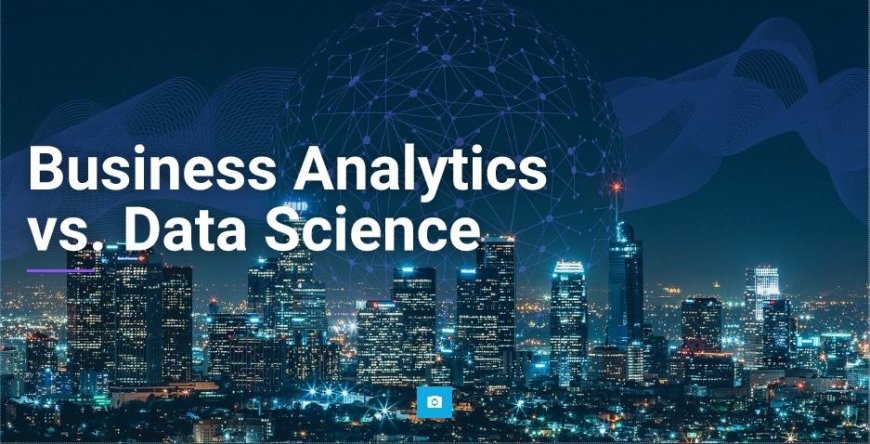The Difference Between Business Analytics and Data Science
Explore the nuances between Business Analytics and Data Science, distinguishing their roles in extracting insights from data. Understand the unique methodologies and applications that set them apart in the realm of data-driven decision-making.

Business analytics and data science are two closely related yet distinct fields. While business analytics focuses on using statistical methods and tools to analyze historical data and make informed business decisions, data science delves deeper into predictive modeling and algorithm development. Business analytics primarily addresses immediate business concerns, while data science explores complex patterns and trends to extract valuable insights for long-term strategic planning. Both fields play crucial roles in leveraging data for organizational success.
What is business analytics?
Business analytics involves the use of data analysis tools and techniques to gather, process, and interpret business information. It's like having a magnifying glass for your company's data, helping you uncover valuable insights and trends. By examining historical data and identifying patterns, businesses can make informed decisions, optimize processes, and gain a competitive edge. It's not about crystal balls or magic spells; instead, it's a practical approach to understanding your business's performance and predicting future outcomes based on evidence rather than gut feelings. In essence, business analytics empowers companies to navigate the complex seas of data, steering them toward success with a clear understanding of their course.
What does a business analyst do?
A business analyst plays a crucial role in helping companies improve their processes and make informed decisions. They act as a bridge between the business stakeholders and the IT team, ensuring that technology solutions meet the organization's needs. Business analysts analyze data, gather requirements, and identify areas for improvement. They work on projects to enhance efficiency, streamline operations, and implement effective solutions. Their goal is to ensure that technology aligns with business goals, resulting in better overall performance and success for the company.
What are the skills of a business analyst?
A business analyst is like a detective of the business world, trying to figure out what a company needs and how to make it better. Here are some key skills they usually have:
1. Analytical Skills: They need to be Sherlock-level detectives when it comes to analyzing data and finding patterns. It's all about making sense of the numbers.
2. Communication Skills: A good business analyst needs to be able to explain their findings in a way that makes sense to everyone, not just other detectives. Clear communication is key.
3. Problem-Solving: Businesses often have issues that need solving. A business analyst needs to be like MacGyver, figuring out creative ways to fix things with the tools at hand.
4. Attention to Detail: It's all in the details. Missing something small could lead to a big problem, so they need to be eagle-eyed.
5. Critical Thinking: They have to be able to look at a situation from different angles and think critically about what's going on and what needs to be done.
6. Adaptability: Things change, mate. A good business analyst can roll with the punches and adjust their investigation as needed.
7. Technical Skills: They don't need to be computer geniuses, but having some tech-savvy skills can help when dealing with all the digital bits and bobs.
Think of them as the detectives working behind the scenes to help businesses run smoother. They might not wear a trench coat, but they're definitely on the case.
What is data science?
Data science is essentially a field that involves extracting valuable insights and knowledge from large sets of data. It combines various techniques from statistics, mathematics, and computer science to analyze and interpret complex data. The process usually includes collecting, cleaning, and organizing data, followed by applying statistical methods to uncover patterns, trends, and correlations. The goal is to gain meaningful insights that can be used for decision-making and problem-solving in different industries. Data science plays a crucial role in helping businesses understand customer behavior, optimizing processes, and making informed strategic decisions. In essence, it's like turning raw data into actionable information for practical applications.
What does a data scientist do?
A data scientist is like a detective for numbers and information. They dig into large sets of data to find patterns, trends, and insights that can help businesses make smart decisions. Imagine you have a massive pile of puzzle pieces—data scientists are the ones who put them together to reveal a clear picture.
They use their skills in math, statistics, and computer programming to analyze data. It's not just about crunching numbers; it's about telling a story with data. For example, they might help a company understand customer behavior, predict future trends, or even improve processes. It's like solving a mystery, but instead of a magnifying glass, they use algorithms and computer programs to uncover the hidden details within the data.
In a nutshell, data scientists are the data detectives who turn raw information into valuable insights that can guide businesses in making informed decisions.
What are the skills of a data scientist?
1. Statistical Knowledge: A data scientist needs to be familiar with statistics. It's like having a good understanding of numbers and patterns to make sense of data.
2. Programming Skills: Think of programming as the language computers understand. Being good at languages like Python or R is crucial for a data scientist.
3. Data Cleaning: Imagine cleaning up your room before guests arrive. Data cleaning is like tidying up messy data, making sure it's accurate and ready for analysis.
4. Data Analysis: This is where the detective work comes in. Data scientists need to analyze information, find trends, and draw meaningful conclusions, just like solving a mystery.
5. Machine Learning: Think of machine learning as teaching computers to learn from data. It's like training a dog – the more data it sees, the smarter it gets.
6. Data Visualization: Instead of presenting a bunch of numbers, data scientists use graphs and charts to tell a story. It's like turning a boring book into an exciting movie.
7. Domain Knowledge: This is like having expertise in a specific field. If you're analyzing health data, it helps to know a bit about medicine.
8. Communication Skills: Imagine explaining a complex idea to a friend who's not into tech stuff. Data scientists need to communicate their findings in a way that anyone can understand.
So, being a data scientist is like being a detective who speaks the language of computers, cleans up messy rooms of data, and tells stories with charts and graphs. It's a mix of skills that helps make sense of the digital world's vast amount of information.
So, what is better for me?
Business analysts take a hands-on approach to their work by having to interact and manage the data while data scientists tend to focus more on data development. As I see it, a business analyst can transition into a data science role with more training hours and experience. I decided to jump into business analytics because of this particular flexibility.
Business analytics focuses on past data to make quick decisions, but data science explores complicated data patterns and predictive modeling to make long-term strategic insights. A data scientist is the detective of numbers, extracting insights from massive data sets, whereas a business analyst is the pragmatic detective, connecting technology and business. Both positions are essential, requiring different skill sets to enable firms to thrive in the data environment.











































